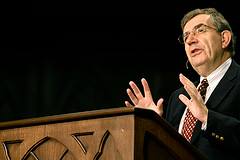1 Cor 11:23ff
Dr. James White:

 Article “Christian, Do You Love God’s Law?” by Dr. Sinclair Ferguson Original source here)
Article “Christian, Do You Love God’s Law?” by Dr. Sinclair Ferguson Original source here)
At a PGA Tour tournament in October 2015, Ben Crane disqualified himself after completing his second round. He did so at considerable financial cost. No matter—Crane believed the personal cost of not doing it would be greater (encouraged by a devotional article he had read that morning by Davis Love III, the distinguished former Ryder Cup captain).
Crane realized he had broken one of the more recondite rules of golf. If I followed the story rightly, while in a hazard looking for his ball, he leaned his club on a stone. He abandoned the ball, took the requisite penalty for doing so, played on, and finished his round. He would have made the Friday night cut comfortably; a very successful weekend financially beckoned. Then Ben Crane thought: “Should I have included a penalty for grounding my club in a hazard?” Sure enough (Rule 13.4a). So he disqualified himself.
(Got it? Hopefully, no readers will lie awake tonight now knowing the trophy was won illegally.)
Crane has been widely praised for his action. No avalanche of spiteful or demeaning attacks on cyberspace or hate mail for being narrow-minded. All honor to him. Intriguingly, no one seems to have said or written, “Ben Crane is such a legalist.”
No, we are not starting a new sports column this month. But how odd it is to see so much praise for his detailed attention to the rules of golf, and yet the opposite when it comes to the rules of life, the (much more straightforward) law of God, even in the church.
There is a problem somewhere.
The Problem
Neither Jesus nor Paul had a problem with the law. Paul wrote that his gospel of grace upholds and establishes the law (Rom. 3:31)—even God’s laws in their negative form, since the “grace of God . . . teaches us to say ‘No’” (Titus 2:11–12 NIV). And remember Jesus’ words in Matthew 5:17–19? Our attitude to the law is a litmus test of our relationship to the kingdom of God.
So what is the problem? The real problem is that we do not understand grace. If we did, we would also realize why John Newton, author of “Amazing Grace,” could write, “Ignorance of the nature and design of the law is at the bottom of most religious mistakes.”
There is a deep issue here. In Scripture, the person who understands grace loves law. (Incidentally, mere polemics against antinomianism can never produce this.)
Think again of Ben Crane. Why keep the complex rules of golf? Because you love the game. Something similar, but greater, is true of the believer. Love the Lord, and we will love His law—because it is His. All is rooted in this beautiful biblical simplicity.
Think of it in terms of three men and the three “stages” or “epochs” they represent: Adam, Moses, and Jesus.
Adam
At creation, God gave commandments. They expressed His will. And since He is a good, wise, loving, and generous God, His commandments are always for our best. He wants to be a Father to us.
As soon as God created man and woman as His image (Gen. 1:26–28—a hugely significant statement), He gave them statutes to follow (v. 29). The context here makes clear the rationale: He is Lord; they are His image. He made them to reflect Him. He is the cosmic Overlord, and they are the earthly under-lords. His goal is their mutual enjoyment of one another and creation in a communion of life (1:26–2:3). So, He has given them a start—a garden in Eden (2:7). He wants them to extend that garden to the ends of the earth, and to enjoy it as miniature creators, images imitating the great original Creator (1:28–29). Continue reading
 Article by Phil Johnson (original source here)
Article by Phil Johnson (original source here)
Antinomianism is one of those theological terms that is notoriously hard to pin down. It has an admittedly sinister sound, and when many people hear the term, they think it speaks of wantonly advocating sin (“Why not do evil that good may come?”—Romans 3:8). Indeed that kind of extreme antinomianism exists. It was the doctrine of Rasputin, for example.
But in normal theological discourse the term antinomianism usually refers to theoretical antinomianism. Theoretical antinomians don’t necessarily advocate extreme libertinism (or practical antinomianism). In fact, a great many theoretical antinomians are known for their advocacy of holiness. (And conversely, many who adhere to “Holiness doctrine” and various other perfectionist schemes are also theoretical antinomians.)
In totally non-technical terms, antinomianism is simply the view that Christians are not bound by any of the precepts of Moses’ law—moral, civil, ceremonial, or otherwise.
The Reformers saw three proper uses of the moral precepts of Moses’ law. Here’s a summary from Article VI of the Lutheran Formula of Concord (the “Epitome,” or short form):
“The Law has been given to men for three reasons: 1) to maintain external discipline against unruly and disobedient men, 2) to lead men to a knowledge of their sin, 3) after they are reborn, and although the flesh still inheres in them, to give them on that account a definite rule according to which they should pattern and regulate their entire life.”
In other words, the “third use of the law” makes the law’s moral standards the rule by which the faithful must order their conduct. In this sense, the moral strictures of the law remain binding on Christians, even though we are “not under the law” in the Pauline sense—i.e., not dependent on our own obedience for any part of our justification. (By the way, the entire Formula of Concord’s Article VI is a brilliant refutation of antinomianism, and well worth reading.)
Calvin said the third use of the law is “the principle use.” He wrote,
The third use of the Law (being also the principal use, and more closely connected with its proper end) has respect to believers in whose hearts the Spirit of God already flourishes and reigns. For although the Law is written and engraven on their hearts by the finger of God, that is, although they are so influenced and actuated by the Spirit, Meaty stuff that they desire to obey God, there are two ways in which they still profit in the Law. For it is the best instrument for enabling them daily to learn with greater truth and certainty what that will of the Lord is which they aspire to follow, and to confirm them in this knowledge; just as a servant who desires with all his soul to approve himself to his master, must still observe, and be careful to ascertain his master’s dispositions, that he may comport himself in accommodation to them. Let none of us deem ourselves exempt from this necessity, for none have as yet attained to such a degree of wisdom, as that they may not, by the daily instruction of the Law, advance to a purer knowledge of the Divine will. Then, because we need not doctrine merely, but exhortation also, the servant of God will derive this further advantage from the Law: by frequently meditating upon it, he will be excited to obedience, and confirmed in it, and so drawn away from the slippery paths of sin. In this way must the saints press onward . . .
Antinomianism, in essence, is a denial of the third use of the law, claiming that the moral law is not binding on Christians.
There are at least three major strains of theoretical antinomianism:
1. Hyper-Calvinistic antinomianism: Advocates of this view and variations thereof include Tobias Crisp and William Huntington, both 18th-century English preachers. (Some would dispute whether Crisp really fits in this category; I think he does.) They insisted that grace eliminates the moral law as a rule of life. Continue reading